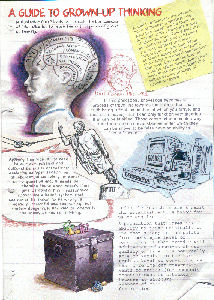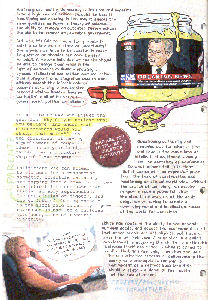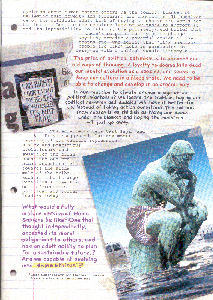I read a lot of magazines–oddly more offline than on. I think this is because my online reading tends to be wide-ranging, shallow, and driven by references from other sources–there are few “online magazines” that I find myself reading “cover to cover”, as it were. Interesting magazines tend to be composed of pieces that are longer, more indepth, and thus more amenable to reading from a page in a non-multitasking environment. This also lends itself more to cover-to-cover consumption, if not the reading of every article.
I read from a fairly broad selection of magazines, on an erratic schedule. Sometimes magazines pile up for months before I get around to taking them in.
One magazine that I often find myself picking up is the New Internationalist, especially when the theme of a given issue is something of interest to me. Late last year I picked up the October 2007 issue, which had a “dumbing down politics” / “infantilization of the public” theme.
I just recently got around to actually going through the issue, most of which is available online, as are quite a few other back issues. I’d recommend taking a minute to look at the contents of that issue especially, and maybe a few more to browse around the archives if you find their contents interesting.
One piece that was left out of the online version of the October issue was a three-page “designy” thing entitled “A Guide To Grown-up Thinking” that was prepared by the magazine’s cartoonist. Since it was probably my favourite piece in the issue
Anyway, you are welcome to click each of the thumbnails below to see the individual pages of the piece, or you can get much larger versions of all three pages in a zip archive as well.
And now, a couple of examples pulled from the piece with some discussion:
In this philosophy knowledge becomes a process of travelling towards the truth, rather than truth being a final destination at which you arrive, and then stop moving.
That’s as a good a one-line description as I’ve seen of the ontological component of my notion of process philosophy. Maybe I lifted that from Karl Popper (reading The Open Universe back in the day did lead to me reading a lot of other Popper works) without knowing it.
(The line I’ve selected becomes a lot more Popper-y in context, when the following one about falsification is added.)
Now a selection on how to apply Popper to personal philosophy/belief systems:
Applying this view of science to our on political and cultural beliefs is effectively declaring an ‘open season’ on all intellectual certainty. It dares us to question and, if needs be, abandon those core beliefs that give us comfort or reassurance.
c.f. The first point in Russell‘s Liberal Decalogue.
And now a little bit on critical thinking:
A population that loses its ability to think critically is one that’s easy to manipulate – from the simple level of convincing us that brand x will achieve an enhancement of our quality of life it’s not really able to supply, to the more serious level of convincing us that a regime our government wants to attack (for economic reasons) must be attacked because it harbours weapons of mass destruction.
That has the ring of Chomsky about it, doesn’t it.
Here, just for some comparison value, is a bit of Manufacturing Consent that I think applies:
“We’re not analyzing the media on Mars or in the eighteenth century or something like that. We’re dealing with real human beings who are suffering and dying and being tortured and starving because of policies that we are involved in, we as citizens of democratic societies are directly involved in and are responsible for, and what the media are doing is ensuring that we do not act on our responsibilities, and that the interests of power are served, not the needs of the suffering people, and not even the needs of the American people who would be horrified if they realized the blood that’s dripping from their hands because of the way they are allowing themselves to be deluded and manipulated by the system.”
Back to the article. This is the money quote:
But who, it’s fair to ask, actually wants to exist in an intellectual state of uncertainty? One in which we have to be constantly ready to question or abandon our core beliefs? An adult.
Oh, and I said some of the article stings me, where it hits my weak spots? That would be bits like this:
Cynicism about human nature offers us the comfort blanket of believing that poverty and suffering are inevitable. It absolves us of the difficult adult task of trying to change the world for the better. Despite the complete lack of evidence to support it, and ts impossibility to falsify, the privately-held belief that there’s no point in trying to change anything remains a powerful crutch of the status quo. The belief that ‘it’s just what people are like’ acts as permission to carry on with a selfish yuppie lifestyle.




